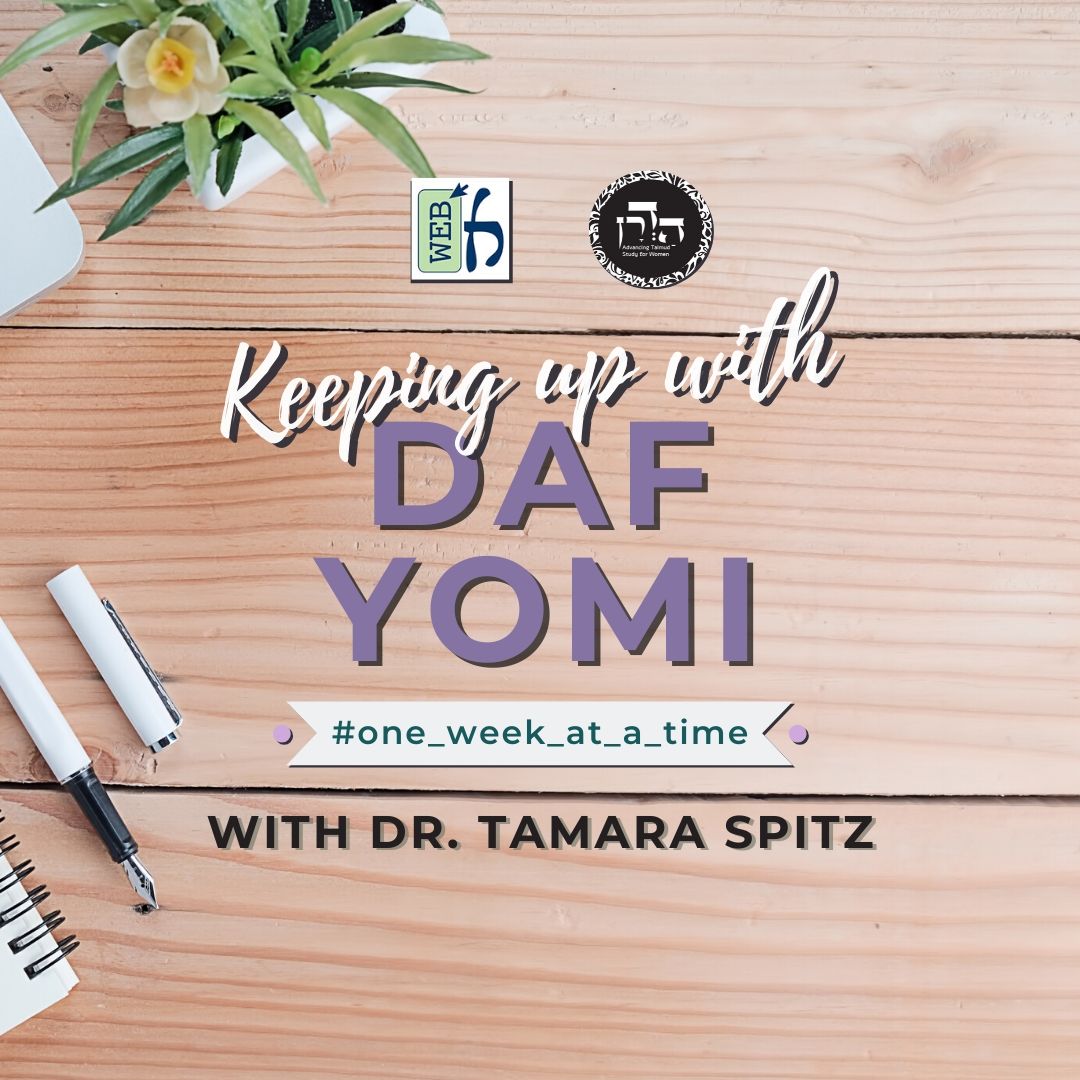Bava Batra 86
פֵּירְקָן וְהִכְנִיסָן לְתוֹךְ בֵּיתוֹ; פָּסַק עַד שֶׁלֹּא מָדַד – אֵין שְׁנֵיהֶן יְכוֹלִין לַחֲזוֹר בָּהֶן, מָדַד עַד שֶׁלֹּא פָּסַק – שְׁנֵיהֶן יְכוֹלִין לַחֲזוֹר בָּהֶן. וּמִדְּכִלְיוֹ דְמוֹכֵר בִּרְשׁוּת לוֹקֵחַ – לֹא קָנָה, כִּלְיוֹ דְלוֹקֵחַ נָמֵי – בִּרְשׁוּת מוֹכֵר לֹא קָנָה!
But in a case where he unloaded the merchandise from them and brought it into his house, if he fixed a price before he measured the merchandise, both parties are no longer able to renege on the sale. If he measured the merchandise before fixing a price, both of them are able to renege on the sale. The Gemara comments: And from the fact that the vessels of the seller when in the domain of the buyer do not effect acquisition of the merchandise for the seller, i.e., they do not prevent the buyer from acquiring the merchandise, one can derive that the vessels of the buyer in the domain of the seller do not effect acquisition of the merchandise on his behalf as well.
אָמַר רַב נַחְמָן בַּר יִצְחָק: בְּשֶׁשְּׁפָכָן. אִיקְּפַד רָבָא – מִידֵּי ״שְׁפָכָן״ קָתָנֵי?! ״פֵּירְקָן״ קָתָנֵי! אֶלָּא אָמַר מָר בַּר רַב אָשֵׁי: בִּמְתַאכְּלֵי דְתוּמֵי.
Rav Naḥman bar Yitzḥak said: The merchandise was not placed in the domain of the buyer in vessels belonging to the seller. Rather, the baraita is referring to a case where he emptied the vessels onto the ground. Conversely, if the merchandise remains in the seller’s vessels, the buyer does not acquire it. Rava became angry with Rav Naḥman bar Yitzḥak at his rejection of Rava’s proof, and retorted: Does the baraita teach: He emptied them? No; it teaches: He unloaded them, i.e., he kept the goods in vessels belonging to the seller. Rather, Mar bar Rav Ashi says: This proof can be rejected by means of a different interpretation, as the halakha of the baraita does not refer to vessels full of goods but is stated with regard to bundles of garlic that were tied together. Therefore, they are unloaded straight onto the floor in the buyer’s domain.
אֲמַר לֵיהּ הוּנָא בְּרֵיהּ דְּמָר זוּטְרָא לְרָבִינָא: מִכְּדֵי ״פֵּירְקָן״ קָתָנֵי; מָה לִי פָּסַק וּמָה לִי לֹא פָּסַק? אֲמַר לֵיהּ: פָּסַק – סָמְכָא דַּעְתֵּיהּ, לֹא פָּסַק – לָא סָמְכָא דַּעְתֵּיהּ.
With regard to the matter itself, Huna, son of Mar Zutra, said to Ravina: Since the baraita teaches: He unloaded them, which indicates that unloading the merchandise constitutes the act of acquisition, what difference is there to me if he fixed a price, and what difference is there to me if he did not fix a price? Ravina said to him: If he fixed a price he has made up his mind to sell, and therefore the transaction can take place. If he did not fix a price, he has not made up his mind to sell and the transaction does not occur. In any event, no convincing proof has been found with regard to the halakha in a case where the vessels of the buyer are in the domain of the seller.
אֲמַר לֵיהּ רָבִינָא לְרַב אָשֵׁי: תָּא שְׁמַע, דְּרַב וּשְׁמוּאֵל דְּאָמְרִי תַּרְוַיְיהוּ: כִּלְיוֹ שֶׁל אָדָם קוֹנֶה לוֹ בְּכׇל מָקוֹם. לְאֵתוֹיֵי מַאי? לָאו לְאֵתוֹיֵי רְשׁוּת מוֹכֵר? הָתָם, דְּאָמַר לֵיהּ: זִיל קְנִי.
Ravina said to Rav Ashi: Come and hear a resolution, as Rav and Shmuel both say: A person’s vessel effects acquisition for him of any item placed inside it, in any place that it is situated. What is added by the phrase: In any place? Does it not serve to add the domain of the seller? Rav Ashi answered: There, it is referring to a specific case, where the seller said to him: Go and acquire it. In that situation, the buyer does acquire the merchandise. This does not refer to a standard case where the buyer’s vessels are located in the domain of the seller.
תְּנַן הָתָם: נְכָסִים שֶׁיֵּשׁ לָהֶן אַחְרָיוּת – נִקְנִין בְּכֶסֶף וּבִשְׁטָר וּבַחֲזָקָה, וְשֶׁאֵין לָהֶן אַחְרָיוּת – אֵין נִקְנִין אֶלָּא בִּמְשִׁיכָה. בְּסוּרָא מַתְנוּ לַהּ לְהָא שְׁמַעְתָּא מִשְּׁמֵיהּ דְּרַב חִסְדָּא; בְּפוּמְבְּדִיתָא מַתְנוּ לַהּ מִשְּׁמֵיהּ דְּרַב כָּהֲנָא, וְאָמְרִי לַהּ מִשְּׁמֵיהּ דְּרָבָא: לֹא שָׁנוּ אֶלָּא דְּבָרִים שֶׁאֵין דַּרְכָּן לְהַגְבִּיהַּ, אֲבָל דְּבָרִים שֶׁדַּרְכָּן לְהַגְבִּיהַּ – בְּהַגְבָּהָה אִין, בִּמְשִׁיכָה לָא.
§ We learned in a mishna elsewhere (Kiddushin 26a): Property that is guaranteed, i.e., land, is acquired by means of money, or by means of a bill, or by taking possession of it. And property that does not have a guarantee, i.e., movable property, can be acquired only by means of pulling. In Sura they taught this following halakha in the name of Rav Ḥisda, while in Pumbedita they taught it in the name of Rav Kahana, and some say in the name of Rava: They taught that movable property is acquired by means of pulling only with regard to items that are not typically lifted due to their weight or for some other reason. But in the case of items that are typically lifted, then yes, they are acquired by means of lifting, but they are not acquired by means of pulling.
יְתֵיב אַבָּיֵי וְקָאָמַר לְהָא שְׁמַעְתָּא; אֵיתִיבֵיהּ רַב אַדָּא בַּר מַתְנָה לְאַבָּיֵי: הַגּוֹנֵב כִּיס בְּשַׁבָּת – חַיָּיב, שֶׁכְּבָר נִתְחַיֵּיב בִּגְנֵיבָה קוֹדֶם שֶׁיָּבֹא לִידֵי אִיסּוּר שַׁבָּת.
Abaye sat and related this halakha. Rav Adda bar Mattana raised an objection to Abaye from a baraita: One who steals a purse on Shabbat is liable for theft. Based on the principle that one who is liable to receive two punishments receives only the greater of the two, in this case one might think that he should be exempt from paying for the theft, as the performance of a prohibited labor on Shabbat is punishable by death. The reason he is liable in this case, in apparent contradiction to that principle, is that he already became liable for the theft as soon as he lifted the purse. This occurred before he came to violate the prohibition of performing prohibited labor on Shabbat by carrying the purse into the public domain.
הָיָה מְגָרֵר וְיוֹצֵא מְגָרֵר וְיוֹצֵא – פָּטוּר, שֶׁהֲרֵי אִיסּוּר שַׁבָּת וּגְנֵיבָה בָּאִין כְּאֶחָד.
The baraita continues: If he did not lift the purse but was dragging it on the ground and exiting the private domain, continuously dragging and exiting, he is exempt, as the prohibition of performing labor on Shabbat and the prohibition of theft are violated simultaneously the moment he drags the purse out of the owner’s property into the public domain. Therefore, he receives only the greater punishment, death, for carrying on Shabbat.
וַהֲרֵי כִּיס – דְּבַר הַגְבָּהָה הוּא, וַאֲפִילּוּ הָכִי קָנֵי בִּמְשִׁיכָה! אֲמַר לֵיהּ: בְּמִיתְנָא. אֲנָא נָמֵי בְּמִיתְנָא קָא אָמֵינָא! אֲמַר לֵיהּ: בְּמִידֵּי דְּבָעֵי מִיתְנָא.
Rav Adda bar Mattana explains his objection: But a purse is an item that can be lifted, and even so it is apparent from the baraita that one acquires it by means of pulling. How then can it be stated that items that are typically lifted are not acquired by pulling? Abaye said to him: The baraita is referring to a case where the thief pulled the purse with a rope. Rav Adda bar Mattana thought that Abaye meant that the thief happened to drag it with a rope, and he responded: I also state my question even in a case where he pulled the purse with a rope, as it is still evident that one can acquire the purse by means of pulling instead of lifting. Abaye said to him: I meant that the baraita is referring to an item that requires a rope. It is a purse that is so large that it cannot be lifted and must be pulled, therefore it is acquired by means of pulling.
תָּא שְׁמַע: בִּרְשׁוּת מוֹכֵר – לֹא קָנָה עַד שֶׁיַּגְבִּיהֶנָּה, אוֹ עַד שֶׁיּוֹצִיאֶנָּה מֵרְשׁוּתוֹ. אַלְמָא, מִידֵּי דְּבַר הַגְבָּהָה – אִי בָּעֵי בְּהַגְבָּהָה קָנֵי לֵיהּ, וְאִי בָּעֵי בִּמְשִׁיכָה קָנֵי לֵיהּ! אָמַר רַב נַחְמָן בַּר יִצְחָק: לִצְדָדִין קָתָנֵי – מִידֵּי דְּבַר הַגְבָּהָה, בְּהַגְבָּהָה; מִידֵּי דְּבַר מְשִׁיכָה, בִּמְשִׁיכָה.
The Gemara raises another objection. Come and hear: If the merchandise is in the domain of the seller, the buyer does not acquire the merchandise until he lifts it or until he removes it from the domain of the seller. Apparently, with regard to an item that can be lifted, if he so desires he acquires it by lifting, and if he so desires he acquires it by pulling. Rav Naḥman bar Yitzḥak said: This is not a proof, as it can be explained that the tanna teaches it disjunctively, i.e., the two options are referring to two different cases: In the case of an item that can be lifted, he acquires it by lifting, whereas with regard to regard to an item that can be pulled, he acquires it by pulling.
תָּא שְׁמַע: הַמּוֹכֵר פֵּירוֹת לַחֲבֵירוֹ, מָשַׁךְ וְלֹא מָדַד – קָנֵי. וְהָא פֵּירוֹת, דִּבְנֵי הַגְבָּהָה נִינְהוּ, וְקָתָנֵי דְּקָנֵי בִּמְשִׁיכָה!
The Gemara suggests: Come and hear a proof from the mishna (84b) that even items that are usually lifted can be acquired by means of pulling: With regard to one who sells produce to another, if the buyer pulled the produce but did not measure it, he has acquired it. The Gemara explains the proof: But produce can be lifted, and yet the mishna teaches that it is acquired by means of pulling.
הָכָא בְּמַאי עָסְקִינַן – בִּשְׁלִיפֵי רַבְרְבֵי. אִי הָכִי, אֵימָא סֵיפָא: הַלּוֹקֵחַ פִּשְׁתָּן מֵחֲבֵירוֹ – לֹא קָנָה עַד שֶׁיְּטַלְטְלֶנּוּ מִמָּקוֹם זֶה לְמָקוֹם אַחֵר. אַטּוּ פִּשְׁתָּן בִּשְׁלִיפֵי רַבְרְבֵי מִי לָא עָבְדִי?! שָׁאנֵי פִּשְׁתָּן – דְּמִשְׁתְּמִיט.
The Gemara rejects this proof: With what are we dealing here? We are dealing with large bundles that are pulled from place to place and are not carried, due to their size. The Gemara asks: If that is so, say the latter clause of the mishna: One who buys flax from another has not acquired it until he carries it from this place to another place, i.e., it is acquired only though lifting and not through pulling. Is that to say that flax is not prepared in large bundles? The Gemara answers: Yes, flax is different. Unlike other produce, flax is not packed in large bundles, as it would slip from its place. Rather, it is packed in small bundles, and therefore flax is acquired specifically through lifting.
אֲמַר לֵיהּ רָבִינָא לְרַב אָשֵׁי, תָּא שְׁמַע: בְּהֵמָה גַּסָּה נִקְנֵית בִּמְסִירָה, וְהַדַּקָּה – בְּהַגְבָּהָה; דִּבְרֵי רַבִּי מֵאִיר וְרַבִּי שִׁמְעוֹן בֶּן אֶלְעָזָר. וַחֲכָמִים אוֹמְרִים: בְּהֵמָה דַּקָּה – בִּמְשִׁיכָה. וְהָא בְּהֵמָה דַּקָּה, דְּבַר הַגְבָּהָה הִיא, וְקָתָנֵי דְּקָנֵי בִּמְשִׁיכָה! שָׁאנֵי בְּהֵמָה, דְּסָרְכָא.
Ravina said to Rav Ashi: Come and hear a proof from a mishna (Kiddushin 25b): Large domesticated animals are acquired through passing the animal’s leash to the buyer, and small domesticated animals are acquired through lifting; this is the statement of Rabbi Meir and Rabbi Shimon ben Elazar. And the Rabbis say: Small domesticated animals are acquired through pulling. Ravina explains the proof: But small domesticated animals are creatures that can be lifted, and yet the mishna teaches that one acquires them through pulling. Rav Ashi rejected this proof: Domesticated animals are different, as they cling to the ground and it is difficult to lift them. Therefore, the usual manner of moving animals is to pull them.
רַב וּשְׁמוּאֵל דְּאָמְרִי תַּרְוַיְיהוּ: ״כּוֹר בִּשְׁלֹשִׁים אֲנִי מוֹכֵר לָךְ״ – יָכוֹל לַחֲזוֹר בּוֹ, אֲפִילּוּ בִּסְאָה הָאַחֲרוֹנָה. ״כּוֹר בִּשְׁלֹשִׁים – סְאָה בְּסֶלַע אֲנִי מוֹכֵר לָךְ״ – רִאשׁוֹן רִאשׁוֹן קָנָה.
§ The Gemara cites another case with regard to sales. Rav and Shmuel both say: If a seller said to a buyer: I am selling you one kor, a measure equivalent to thirty se’a, of grain for the price of thirty sela, the seller can renege on the sale as long as the measuring vessel is not filled, even when only the last se’a has yet to be measured, because he had agreed to sell only a complete kor. By contrast, if the seller said: I am selling you one kor for thirty sela and each se’a is sold for one sela, he cannot completely renege on the sale in the middle of the transaction. This is because the buyer acquires each se’a one by one as it is measured, since the seller sold each se’a individually.
תָּא שְׁמַע: אִם הָיְתָה מִדָּה שֶׁל אֶחָד מֵהֶן – רִאשׁוֹן רִאשׁוֹן קָנָה. וְאַף עַל גַּב דְּלֹא נִתְמַלְּאָה הַמִּדָּה!
The Gemara raises a difficulty from the baraita cited on 85a. Come and hear: If the measuring vessel belonged to one of them, the buyer acquires the items of sale one by one. And since this halakha is stated in general terms, it indicates that the buyer acquires each item as it is placed in the measuring vessel, even though the measuring vessel was not filled.
כְּגוֹן דַּאֲמַר לֵיהּ: ״הִין בִּשְׁנֵים עָשָׂר סְלָעִים – לוֹג בְּסֶלַע אֲנִי מוֹכֵר לָךְ״; וְכִדְאָמַר רַב כָּהֲנָא: שְׁנָתוֹת הָיוּ בַּהִין, הָכָא נָמֵי – שְׁנָתוֹת הָיוּ בַּמִּדּוֹת.
The Gemara answers: The baraita is referring to a case where the seller said to him: I am selling you one hin, a liquid measure equivalent to twelve log, for twelve sela, each log for one sela. And this is in accordance with an observation that Rav Kahana says: In the Temple there were markings on the vessel that measured hin, with which one could measure the different libations. Here too, there were markings on the measuring vessels, and since the measuring vessel indicates at which point each log had been filled, the buyer acquires it. This is comparable to the case of one who sells each se’a individually.
תָּא שְׁמַע: הַשּׂוֹכֵר אֶת הַפּוֹעֵל לַעֲשׂוֹת עִמּוֹ לַגּוֹרֶן הַיּוֹם בְּדִינָר,
The Gemara raises another difficulty. Come and hear: One who hires a laborer in the winter or the spring to work for him in the harvest, for one dinar a day,






















